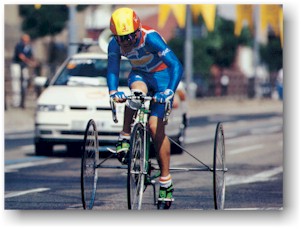Paralympic Games in Athens, Greece



There will be NO AMERICAN TV COVERAGE OF THE PARALYMPICS. Not one hour of live coverage. Not one commentator. Nothing. Does this bother you? NBC's Vice President of Sports Communications is Kevin Sullivan. He can be contacted on (212)664 2014 or at kevin.sullivan@nbcuni.com Let him know what you think.
In 1948, Sir Ludwig Guttmann organized a sports competition involving World War II veterans with a spinal cord injury in Stoke Mandeville, England. Four years later, competitors from Holland joined the games and the international movement, now known as the Paralympics, was born. Olympic style games for athletes with a disability were organized for the first time in Rome in 1960. In Toronto in 1976, other disability groups were added and the idea of merging together different disability groups for international sport competitions was born. In the same year, the first Paralympic Winter Games took place in Sweden.
Today, the Paralympics are elite sport events for athletes from six different disability groups. They emphasize, however, the participants' athletic achievements rather than their disability. The movement has grown dramatically since its first days. The number of athletes participating in Summer Paralympic Games has increased from 400 athletes in Rome in 1960 to 3843 in Sydney in 2000. In Sydney, a record number of 122 countries, or 123 delegations including independent athletes from East Timor, participated at the Paralympics, making this the largest Games in Paralympic history.
The Paralympic Games have always been held in the same year as the Olympic
Games. Since the Seoul Summer Games (1988) and the Albertville Winter Games
(1992) they have also taken place at the same venues as the Olympics. On 19 June
2001 an agreement was signed between IOC and IPC securing this practice for the
future. From the 2012 bid process onwards, the host city chosen to host the
Olympic Games will be obliged to host the Paralympics as well.
The next
Paralympic Games will take place in Athens, Greece, in 2004.
Two weeks after the completion of the Olympic Games, the best Paralympic athletes will come to Athens to compete in the Paralympic Games. The general philosophy of the Paralympic Games is to follow the rules of the Olympic sports as much as possible.
Such a philosophy is already implied in the name of the event. The term “Paralympic” derives from the word “Olympic” and the prefix “Para”, a Greek preposition which means “close to”. The Paralympic Games is an elite sports event in terms of both the organisation and the actual competition.
From the 17th to the 28th of September 2004 Athens will welcome 4,000 Paralympic athletes from more than 130 countries, as well as over 2,000 team officials. All will be accommodated at the Paralympic Village.
About 2500 media representatives will cover the ATHENS 2004 Paralympic Games while approximately 1,000 technical officials and 15,000 volunteers will provide assistance.
The event will also be attended by 2,500 members of the Paralympic Family (representatives of the International Paralympic Committee (IPC), the National Paralympic Committees (NPCs) etc.), will also attend the whole event.
The Paralympic Games will be held at the same Olympic Venues which are provided with the necessary facilities to accommodate the athletes and spectators. At the same time, infrastructure is being upgraded in all cities so as to ensure their accessibility to all.
In order to establish equitable practices, athletes competing in the Paralympic Games will, for the first time in the history of the events, not have to pay any participation fees. By abolishing the participation fees, ATHENS 2004 wishes to eliminate any discrimination between the athletes taking part in the Olympic and Paralympic Games.
In addition to abolishing the fees for the first time, ATHENS 2004 is the first Organising Committee for the Olympic Games since the signing of the 2001 IOC-IPC Agreement which, operating under a unified management structure, is responsible for organising both the Olympic and the Paralympic Summer Games. The Paralympic Games Division is responsible for providing strategic planning, coordination and support to all ATHENS 2004 departments and divisions while working closely with the International Paralympic Committee (IPC)
See also Greece for the Physically Disabled and Helpful Information for Wheelchair Users from an Athens 2004 Paralympic Athlete
Events in Athens 2004
|
|
|

